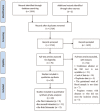Systematic review and meta-analysis of vitamin D deficiency in different pregnancy on preterm birth: Deficiency in middle pregnancy might be at risk
- PMID: 34128867
- PMCID: PMC8213249
- DOI: 10.1097/MD.0000000000026303
Systematic review and meta-analysis of vitamin D deficiency in different pregnancy on preterm birth: Deficiency in middle pregnancy might be at risk
Abstract
Background: Current studies suggest that vitamin D deficiency during pregnancy can produce a certain effect for preterm birth (PTB), but there is no research showing whether vitamin D deficiency has a consistent effect in different pregnancies; thus, we conducted a systematic review and meta-analysis of 24 observational studies, grouping them according to the gestational age at the time of serum sampling, to investigate whether vitamin D deficiency in different periods of gestation has different effects on PTB and to provide an evidence-based basis for pregnant women to measure and supplement vitamin D.
Methods: The databases PubMed-Medline, EMBASE, the Cochrane Library, Web of Science, EBSCO, CBM, and CNKI were searched until February 2020. Two researchers independently assessed the eligibility and quality of studies, and STATA 12.0 software was used for meta-analysis.
Result: Seven cohort studies, 13 case-control studies, and 4 cross-sectional studies were included from 2500 articles by inclusion and exclusion criteria. After adjusting for age, race, and other confounding factors, meta-analysis results showed that vitamin D deficiency in the first trimester, the second trimester, and the third trimester did not increase the risk of PTB (odds ratio (OR) = 1.01, 95% confidence interval (CI) (0.88, 1.16), P = .867; OR = 1.12, 95%CI (0.92, 1.37), P = .249; OR = 1.05, 95%CI (0.87, 1.27), P = .602). However, there was moderate heterogeneity in the study of vitamin D deficiency in the second trimester, and subgroup analysis suggested that vitamin D deficiency in the second trimester may increase the risk of PTB (OR = 1.33, 95%CI (1.15, 1.54), P = .000). A sensitivity analysis of the second trimester showed that excluding any 1 study did not significantly change the results.
Conclusions: Vitamin D deficiency in early and late pregnancy may not be associated with PTB, while vitamin D deficiency in middle pregnancy is likely to have an important effect on PTB. Vitamin D levels should be measured in the second trimester of pregnancy, and vitamin D supplements should be provided if necessary.
Copyright © 2021 the Author(s). Published by Wolters Kluwer Health, Inc.
Conflict of interest statement
The authors have no conflicts of interest to disclose.
Figures







Similar articles
-
Does Maternal Vitamin D Deficiency Increase the Risk of Preterm Birth: A Meta-Analysis of Observational Studies.Nutrients. 2016 May 20;8(5):301. doi: 10.3390/nu8050301. Nutrients. 2016. PMID: 27213444 Free PMC article. Review.
-
Interventions during pregnancy to prevent preterm birth: an overview of Cochrane systematic reviews.Cochrane Database Syst Rev. 2018 Nov 14;11(11):CD012505. doi: 10.1002/14651858.CD012505.pub2. Cochrane Database Syst Rev. 2018. PMID: 30480756 Free PMC article.
-
Vitamin D deficiency in pregnancy and the risk of preterm birth: a nested case-control study.BMC Pregnancy Childbirth. 2023 May 6;23(1):322. doi: 10.1186/s12884-023-05636-z. BMC Pregnancy Childbirth. 2023. PMID: 37149566 Free PMC article.
-
Maternal Vitamin D Insufficiency Early in Pregnancy Is Associated with Increased Risk of Preterm Birth in Ethnic Minority Women in Canada.J Nutr. 2017 Jun;147(6):1145-1151. doi: 10.3945/jn.116.241216. Epub 2017 Apr 19. J Nutr. 2017. PMID: 28424259
-
Vitamin D and risk of preterm birth: Up-to-date meta-analysis of randomized controlled trials and observational studies.J Obstet Gynaecol Res. 2017 Feb;43(2):247-256. doi: 10.1111/jog.13239. J Obstet Gynaecol Res. 2017. PMID: 28150405 Review.
Cited by
-
Vitamin D: What We Know and What We Still Do Not Know About Vitamin D in Preterm Infants-A Literature Review.Children (Basel). 2025 Mar 20;12(3):392. doi: 10.3390/children12030392. Children (Basel). 2025. PMID: 40150674 Free PMC article. Review.
-
Maternal serum concentrations of vitamin D in pregnancy and preterm birth: a case-control study in Southern Sweden.Eur J Nutr. 2025 May 31;64(5):198. doi: 10.1007/s00394-025-03716-8. Eur J Nutr. 2025. PMID: 40448825 Free PMC article.
-
Vitamin D Status as an Important Predictor of Preterm Birth in a Cohort of Black Women.Nutrients. 2023 Nov 1;15(21):4637. doi: 10.3390/nu15214637. Nutrients. 2023. PMID: 37960290 Free PMC article.
-
Periodontal Disease and Vitamin D Deficiency in Pregnant Women: Which Correlation with Preterm and Low-Weight Birth?J Clin Med. 2021 Oct 2;10(19):4578. doi: 10.3390/jcm10194578. J Clin Med. 2021. PMID: 34640596 Free PMC article.
-
Prenatal Vitamin D Deficiency and Maternal and Fetal Health Outcomes.Cureus. 2024 Sep 16;16(9):e69508. doi: 10.7759/cureus.69508. eCollection 2024 Sep. Cureus. 2024. PMID: 39416583 Free PMC article. Review.
References
-
- WHO: recommended definitions, terminology and format for statistical tables related to the perinatal period and use of a new certificate for cause of perinatal deaths. Modifications recommended by FIGO as amended October 14, 1976. Acta Obstet Gynecol Scand 1977;56:247–53. - PubMed
-
- Frey HA, Klebanoff MA. The epidemiology, etiology, and costs of preterm birth. Semin Fetal Neonatal Med 2016;21:68–73. - PubMed
-
- Liu NQ, Kaplan AT, Lagishetty V, et al. . Vitamin D and the regulation of placental inflammation. Reprod Sci 2011;18:167A.doi:10.1177/193371912011183s067. - PubMed
-
- Vogel JP, Chawanpaiboon S, Moller AB, Watananirun K, Bonet M, Lumbiganon P. The global epidemiology of preterm birth. Best Pract Res Clin Obstet Gynaecol 2018;52:03–12. - PubMed
-
- Platt MJ. Outcomes in preterm infants. Public Health 2014;128:399–403. - PubMed
Publication types
MeSH terms
Substances
LinkOut - more resources
Full Text Sources
Medical

